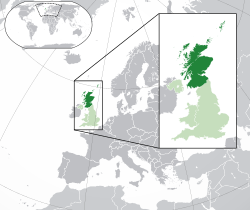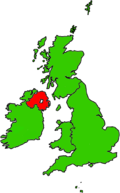Portal:Scotland
| Main Page | Selected articles 1 | Selected articles 2 | Selected biographies | Selected quotes | Selected pictures | Featured Content | Categories & Topics |
Introduction
 |

|
|

| ||
Scotland is a country that is part of the United Kingdom. It contains nearly one-third of the United Kingdom's land area, consisting of the northern part of the island of Great Britain and more than 790 adjacent islands, principally in the archipelagos of the Hebrides and the Northern Isles. To the south-east, Scotland has its only land border, which is 96 miles (154 km) long and shared with England; the country is surrounded by the Atlantic Ocean to the north and west, the North Sea to the north-east and east, and the Irish Sea to the south. The population in 2022 was 5,439,842. Edinburgh is the capital and Glasgow is the most populous of the cities of Scotland.
The Kingdom of Scotland emerged as an independent sovereign state in the 9th century. In 1603, James VI succeeded to the thrones of England and Ireland, forming a personal union of the three kingdoms. On 1 May 1707, Scotland and England combined to create the new Kingdom of Great Britain, with the Parliament of Scotland subsumed into the Parliament of Great Britain. In 1999, a Scottish Parliament was re-established, and has devolved authority over many areas of domestic policy. The Scottish Government is the executive arm of the devolved government, headed by the first minister who chairs the cabinet and responsible for government policy and international engagement. Further powers are devolved to local government from the Scottish Government to the country's 32 subdivisions (known as "council areas").
The country has its own distinct legal system, education system and religious history, which have all contributed to the continuation of Scottish culture and national identity. Scottish English and Scots are the most widely spoken languages in the country, existing on a dialect continuum with each other. Scottish Gaelic speakers can be found all over Scotland, but the language is largely spoken natively by communities within the Hebrides; Gaelic speakers now constitute less than 2% of the total population, though state-sponsored revitalisation attempts have led to a growing community of second language speakers.
The mainland of Scotland is broadly divided into three regions: the Highlands, a mountainous region in the north and north-west; the Lowlands, a flatter plain across the centre of the country; and the Southern Uplands, a hilly region along the southern border. The Highlands are the most mountainous region of the British Isles and contain its highest peak, Ben Nevis, at 4,413 feet (1,345 m). The region also contains many lakes, called lochs; the term is also applied to the many saltwater inlets along the country's deeply indented western coastline. The geography of the many islands is varied. Some, such as Mull and Skye, are noted for their mountainous terrain, while the likes of Tiree and Coll are much flatter.
Selected article

A kilt (Scottish Gaelic: fèileadh [ˈfeːləɣ]) is a garment resembling a wrap-around knee-length skirt, made of twill-woven worsted wool with heavy pleats at the sides and back and traditionally a tartan pattern. Originating in the Scottish Highland dress for men, it is first recorded in the 16th century as the great kilt, a full-length garment whose upper half could be worn as a cloak. The small kilt or modern kilt emerged in the 18th century, and is essentially the bottom half of the great kilt. Since the 19th century, it has become associated with the wider culture of Scotland, and more broadly with Gaelic or Celtic heritage.
Although the kilt is most often worn by men on formal occasions and at Highland games and other sporting events, it has also been adapted as an item of informal male clothing, returning to its roots as an everyday garment. Kilts are now made for casual wear in a variety of materials. Alternative fastenings may be used and pockets inserted to avoid the need for a sporran. Kilts have also been adopted as female wear for some sports. (... Read the full article)
Selected quotes
In the news

- 24 May 2025 – 2024–25 Scottish Cup
- In association football, Aberdeen F.C. wins their 9th Scottish Cup and their first in 35 years after defeating 42-time winners Celtic F.C. 4–3 in the final on penalties after a 1–1 draw at Hampden Park in Glasgow. (BBC Sport)
- 16 April 2025 – Transgender rights in the United Kingdom, For Women Scotland Ltd v The Scottish Ministers
- The Supreme Court of the United Kingdom rules that legal gender is based upon biological sex for the purposes of the Equality Act 2010. (BBC News)
Selected biography
Charlotte Stuart, styled Duchess of Albany (29 October 1753 – 17 November 1789) was the illegitimate daughter of the Jacobite pretender Charles Edward Stuart ("Bonnie Prince Charlie" or the "Young Pretender") and his only child to survive infancy.
Charlotte's mother was Clementina Walkinshaw, who was mistress to Charles Edward from 1752 until 1760. After years of abuse, Clementina left him, taking Charlotte with her. Charlotte spent most of her life in French convents, estranged from a father who refused to make any provision for her. Unable to marry, she herself became a mistress with illegitimate children, taking Ferdinand de Rohan, Archbishop of Bordeaux, as her lover.
She was finally reconciled with her father in 1784, when he legitimised her and created her Duchess of Albany in the Jacobite peerage. She left her children with her mother, and became her father's carer and companion in the last years of his life, before dying less than two years after him. Her offspring was raised in anonymity; however, as Prince Charles Stuart's only grandchildren, they have been the subject of Jacobite interest since their lineage was uncovered in the 20th century. (... Read the full article)
Selected picture
Did You Know...

- ... that the Scottish surgeon John Blair was the only dux of his high school to receive his gold medal in the presence of his wife and child?
- ... that the unlicensed Willy's Chocolate Experience in Scotland led to a crossover event between the American television series Abbott Elementary and It's Always Sunny in Philadelphia?
- ... that the Scottish medical missionary Ernest Muir championed the use of the traditional Ayurvedic cure chaulmoogra oil in treating Hansen's disease (leprosy)?
- ... that East Suffolk Park, a former student hostel in Edinburgh, was once an internment camp for enemy aliens?
- ... that despite his defeat at the battle of Pitgaveny, both of Duncan's sons would later rule Scotland?
- ... that Prince Philip was the first member of the British royal family to fly in a helicopter?
- ... that Davy Russell won a 2025 Scottish election despite being dubbed the "invisible man" by an opponent?
- ... that the Aesculapian Club, founded in Edinburgh in 1773, still meets twice a year?
Get involved
For editor resources and to collaborate with other editors on improving Wikipedia's Scotland-related articles, see WikiProject Scotland.
To get involved in helping to improve Wikipedia's Scotland related content, please consider doing some of the following tasks or joining one or more of the associated Wikiprojects:
- Visit the Scottish Wikipedians' notice board and help to write new Scotland-related articles, and expand and improve existing ones.
- Visit Wikipedia:WikiProject Scotland/Assessment, and help out by assessing unrated Scottish articles.
- Add the Project Banner to Scottish articles around Wikipedia.
- Participate in WikiProject Scotland's Peer Review, including responding to PR requests and nominating Scottish articles.
- Help nominate and select new content for the Scotland portal.
Do you have a question about The Scotland Portal that you can't find the answer to?
Post a question on the Talk Page or consider asking it at the Wikipedia reference desk.
Related portals
Other language versions
Associated Wikimedia
The following Wikimedia Foundation sister projects provide more on this subject:
-
Commons
Free media repository -
Wikibooks
Free textbooks and manuals -
Wikidata
Free knowledge base -
Wikinews
Free-content news -
Wikiquote
Collection of quotations -
Wikisource
Free-content library -
Wikispecies
Directory of species -
Wikiversity
Free learning tools -
Wikivoyage
Free travel guide -
Wiktionary
Dictionary and thesaurus

































































